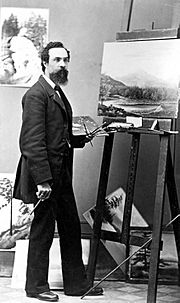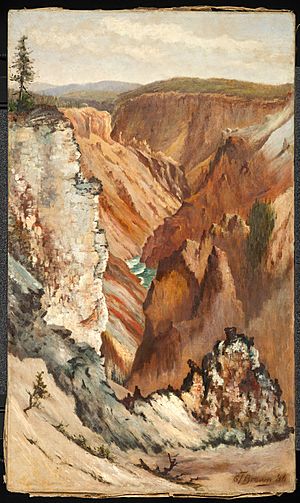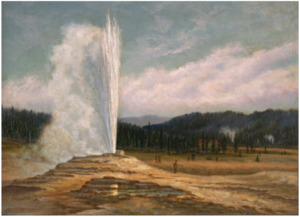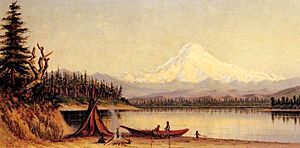Grafton Tyler Brown facts for kids
Quick facts for kids
Grafton Tyler Brown
|
|
|---|---|
 |
|
| Born | February 22, 1841 |
| Died | March 2, 1918 (aged 77) |
| Nationality | American |
| Known for | Painter, lithographer, and cartographer |
Grafton Tyler Brown (born February 22, 1841 – died March 2, 1918) was an amazing American artist. He was a talented painter, a lithographer (someone who makes prints using a special stone or metal plate), and a cartographer (a mapmaker). What makes him extra special is that he was the first African-American artist to create art showing the beautiful landscapes of the Pacific Northwest and California.
Contents
Early Life and Learning
Grafton Tyler Brown was born in Harrisburg, Pennsylvania, on February 22, 1841. His parents, Wilhelmina and Thomas Brown, were born free in Maryland. They moved to Pennsylvania in 1837. Grafton's father was a freedman (a person who was once enslaved but became free). He also helped with the abolitionist movement, which worked to end slavery.
When Grafton was about 14 years old, he started working for a printer in Philadelphia. This job was very important for his future. It was there that he learned the skill of lithography. This is a way of printing images and text from a flat surface.
Artistic Journey
Starting in San Francisco
In 1858, Brown moved to San Francisco. He first worked in a hotel. But soon, he used his lithography skills. From 1861 to 1867, he worked at a company called Kuchel & Dressel. Then, in 1867, he opened his very own business!
During the 1870s, California was a busy place, especially with mining. Brown's company made many things. He created advertisements, maps, and special money (called scrip) for different clients. In 1878, he made a book called The Illustrated History of San Francisco. This book had 72 detailed pictures of the city's landscapes. Brown's work helped document new towns, land sales, and city borders in the Bay Area and Nevada Territory.
Exploring the Pacific Northwest
In 1879, Brown sold his company. He left San Francisco in 1882 and moved to Victoria, British Columbia, in Canada. There, he joined a group called the Amos Bowman Geological Survey. This group studied the Earth's features. Brown worked as a draftsman, drawing maps and pictures of the Cascade Mountains.
In 1884, he moved back to the United States. He traveled all over the northwest and west. He painted amazing places like Mount Rainier. He lived in Portland, Oregon, and painted many beautiful landscapes. He also visited famous national parks like Yosemite and Yellowstone National Park to capture their beauty on canvas.
Later Years and Legacy
In 1893, Brown moved to Saint Paul, Minnesota. He worked there as a draftsman again. He worked for the United States Army Corps of Engineers and for the city's engineering department. Grafton Tyler Brown passed away in St. Peter, Minnesota, on March 2, 1918.
His artworks are now kept in many important museums. You can find his pieces at the Royal British Columbia Museum, the Oakland Museum of California, the Crocker Art Museum in Sacramento, California, the Smithsonian American Art Museum, and the Los Angeles County Museum of Art.
Art Shows and Exhibitions
Grafton Tyler Brown's art has been shown in special exhibitions. These shows help people learn about his work and his important place in art history.
- Blacks in the Westward Movement, 1975, Anacostia Community Museum
- Grafton Tyler Brown: Visualizing California and the Pacific Northwest, California African American Museum and Walters Art Museum




